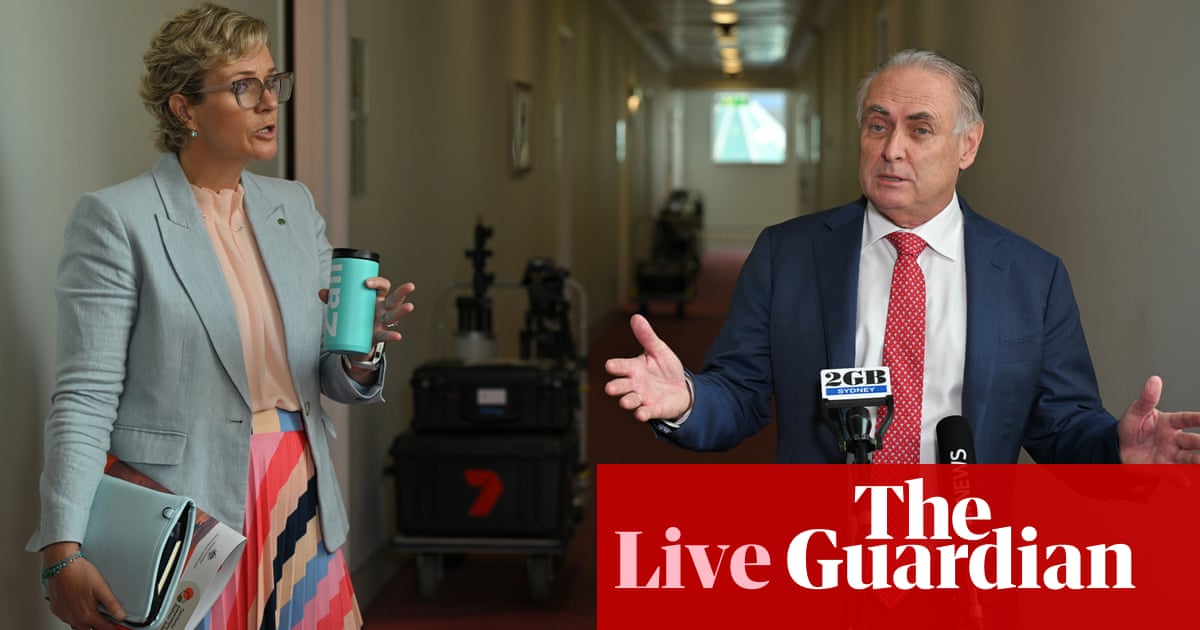Key events

Jonathan Barrett
IAG almost doubles profit as premiums rise
Insurance Australia Group has almost doubled its half-year net profit to $778m, backed by increased premiums during a difficult period for households grappling with high living costs.
The IAG managing director, Nick Hawkins, said the result was delivered in a period of favourable weather. He partly attributed the strong figure to the release of money previously set aside for pandemic business disruptions.
Our results reflect the volatility of our sector and the fact we’re often subject to factors outside our control – the good years help us weather the bad.
Fast-rising insurance premiums, largely overlooked as a driver of inflation in recent years, have been a standout contributor to rising household costs.
The six-month profit result was up 91% on the corresponding period, and its dividend lifted by 20%. Australia’s biggest general insurer reported expanding insurance margins, reflecting an increase in profitability.
The results come at a politically sensitive time given the upcoming election is expected to be fought on competing cost-of-living policies.
On Wednesday, Commonwealth Bank delivered a bumper $5.13bn half-year cash profit even as customers grappled with elevated borrowing rates.

Josh Butler
That standoff between Don Farrell and Zali Steggall was one for the books. The trade minister had stopped in the corridors of the press gallery for a brief press conference – his staff said he only had a few minutes before a meeting, but he took some questions on the electoral reform bill which was rammed through the Senate last night.
After fielding a few questions on the reasons why they needed to cannonball the bill through the parliament, in a process crossbenchers were livid about, Farrell maintained he’d been consulting widely on the changes, in a not-so-veiled rebuke of the crossbench criticisms.
If people didn’t know what was going on, it was their choice. But I’ve made myself available. My staff have made themselves available
Moments later, who was to also emerge from the ABC studios behind him but … Zali Steggall, who is among those absolutely livid about the bill.
Standing in the media scrum before Farrell, a few of us journalists exchanged looks, knowing the picture value of Steggall looking unhappy in the background of the minister’s remarks.
And then she walked right up to him, standing inches from Farrell, as he continued his defence of the bill.
“Why don’t you tell the Australian people what is going to happen?” she interjected, pointing to the cameras. Farrell, who clearly was not expecting a public debate in the halls of parliament, sputtered back that he didn’t agree with her.
It went on for another few minutes, the two politicians arguing directly about the ins and outs of the bill, before Farrell was asked about trade tariffs and Steggall moved off to the side.
Don Farrell and Zali Steggall in confrontation over electoral changes
There’s something interesting happening in the parliamentary corridor.
Don Farrell, who’s walked out of the ABC studio has been in the corridor doing a doorstop with the media, when he was asked questions by … independent Zali Steggall, a key critic of the bill.
You might call it democracy in action, and the exchange gets a little heated.
Here’s some of what was said below:
Steggall: Why don’t you tell young people that what is going to happen is the big money that will be in politics is the public money, because now the public is paying for the money that you want to still spend during elections, and the only people that participate in elections will be union members.
Farrell: That that is completely untrue. Unions are subject to exactly the same rules …
Steggall: … or members of the Labor party.
Farrell: Well, you got stop changing your story. Either, either you think that it’s the unions getting some benefit out of this, unions are subject to exactly the same rules that every other donor is subject to.
And it continues …
Josh Butler was there, and you can see more of the exchange here:
Minister Don Farrell and Zali Steggall argue about electoral reform in parliament – Steggall, walking by, crashed his press conference to criticise the changes
Farrell: “there are no secret loopholes”, criticising “candidates supported by millionaires and billionaires” pic.twitter.com/aK0SRQEILx
— Josh Butler (@JoshButler) February 12, 2025

Emily Wind
James Paterson says the NSW hospital workers who threatened to refuse treatment to, and to kill, Israeli patients in a video on social media should be stripped of their registration.
Speaking to Sky News earlier, the shadow home affairs minister welcomed news that NSW Police were investigating the incident and that the pair had been stood down from their jobs. But he wants to see more action from the federal government:
The federal government regulates the health profession in terms of the registration of doctors and nurses, and as of last night, those two nurses were still registered through the national regulator.
That registration should be stripped because, while they’ve been banned from the NSW public health system, that doesn’t stop them working in the private system, and they shouldn’t be anywhere near any patients, [given] they’ve said that they wouldn’t treat people based on their nationality or ethnicity …
For anyone to think it’s a good idea to say this in any context, but to say it at their workplace, in their uniforms, on a recorded video, just shows how rampant this problem [of antisemitism] is and how decisive leadership is needed to tackle it.
Don Farrell defends electoral donations laws
On to electoral donations – which Farrell is also in charge of – he’s asked about criticisms from the independents that the legislation disadvantages new contenders, and entrenches the two-party system.
Farrell says Australia “shouldn’t be beholden to billionaires”.
We’re actually reducing the amount of money that the major political parties can spend on an election, and that is to the benefit of all candidates. And can I say this Sally, we’ve kept the amount of money you can spend on a single electorate at $800,000. If you can’t pick your message out to the Australian people with a spend of $800,000 [then] there’s something wrong with your campaign.
He also bats away criticism the legislation was passed without proper process or scrutiny.
Farrell says, “In the time that I became the special minister of state three years ago, we have worked on reforming the Australian electoral system”.
There’s been some confusion around whether there was another agreement that was put in place after Australia secured exemptions from tariffs under the first Trump presidency.
Sally Sara asks whether the Coalition gave a verbal agreement to Trump about limiting aluminium exports to the US during the Morrison government.
Farrell says the then prime minister, Scott Morrison, and the then trade minister, Simon Birmingham, would know.
What I’m aware of is what we’ve been doing over the last three years, and I think we have been complying with all of the arrangements that were in place and the appropriate arrangements that were in place to ensure that we continue to supply high-quality Australian-made aluminium into the American market.
Farrell also points to the impact of Russia’s war in Ukraine – that prevented some Russian aluminium exports getting into the US. He says he understands Australia increased its export to the US to make up for some of that aluminium export shortage from Russia.
Australian aluminium not flooding the US market: Farrell
The trade minister, Don Farrell, says he doesn’t believe Australia is “flooding” the US market with our aluminium, as suggested by Donald Trump’s senior trade adviser Peter Navarro.
He’s told ABC RN Breakfast:
I don’t believe we’re, we’ve done at any stage, anything that has not been agreed to by the American government.
I’m sure that we comply with all of the obligations that America imposes on those companies that are supplying into the United States, and that wouldn’t matter whether it was beef or lamb or grain or steel or aluminium, I would be absolutely certain Australian companies comply with all of their obligations in terms of reporting into the United States.
Sally Sara asks whether the Department of Foreign Affairs has been reporting the exports Australia has been exporting to the US Department of Commerce, but Farrell says he doesn’t know “exactly how that information is collected by the Americans”
He reiterates the point – which Trump also mentioned this week – that the US has a trade surplus with Australia.
Goverment says nuclear power would require an extra Sydney Harbour’s worth of water a year
Tanya Plibersek is also asked about this story that my colleague Dan Jervis-Bardy has this morning.
Government analysis supplied to Guardian Australia suggests the Coalition’s plan to replace retired coal-fired power stations with nuclear power plants would require an additional 508,000 megalitres each year.
How much is that? Plibersek, the environment minister, says it’s a lot:
It’s about an extra Sydney Harbour’s worth of water that we would have to find every year and we’ve seen already overseas in Europe, for example, in hot, dry years, nuclear reactors having to be shut down or reduce their production capacity because the water isn’t there, and when the water is used in those nuclear reactors, it’s released into the environment and warmer than it normally would be, and that obviously has environmental impacts all of its own.
Dan’s gone through all the numbers and you can see the full story here:
Are the electoral reforms a ‘stitch up’ as the independents say?
Cabinet minister Tanya Plibersek told ABC News Breakfast earlier the reforms passed last night with the support of the Coalition help keep out big money and big donors such as Clive Palmer (who also yesterday lost his high court bid to re-register his party, the United Australia party).
The rules apply equally to any candidate, and they say that we don’t want billionaires running our electoral system. The reforms have come after a great deal of consultation, many parliamentary reports, community consultation and work with other parties and the crossbench.
The argument from the independents is that for new challengers they’ve got $800,000 while a party has up to $90m which they can use for national ad campaigns.
Either way, these changes won’t be in place this election, they will come into effect for the following one around 2028.
Good morning,
Krishani Dhanji here with you on the last sitting day of the fortnight, we’ve made it.
This is one of the last, or possibly the last sitting day before the election. Last night’s deal between the Coalition and Labor on electoral reform was one of the key policies the government was hoping to secure before we head to the polls, after passing a bill to legislation production tax credits earlier this week.
As we’ve been reporting this morning, the prime minister will soon deliver a speech in parliament at a breakfast, marking 17 years since Kevin Rudd’s apology to the Stolen Generations.
And no doubt Donald Trump’s tariffs will continue dominating the agenda – here and abroad.
It’s going to be a big one!
Right to disconnect laws found to have reduced unpaid overtime by a third
Workers are doing less unpaid work since right to disconnect laws kicked in, Australian Associated Press reports.
But unions warn that scrapping the measure would add 100 minutes of overtime each week for which employees aren’t compensated.
Under the laws, which came into effect for most workers in August 2024, employees are allowed to reasonably refuse to respond during out of work hours.
Analysis by the Centre for Future Work found since the laws were introduced, the amount of unpaid overtime fell from 5.4 to 3.6 hours a week – a 33% reduction.
Before the right to disconnect was introduced, average wage earners in Australia completed about 3.3bn hours of unpaid work, with that figure dropping down to 2.2bn.
Young Australians aged 18 to 29 experienced the greatest decline in unpaid work.
The opposition leader, Peter Dutton, has pledged to wind back the laws. The ACTU secretary, Sally McManus, said this was “astounding”.

Josh Butler
More on the Albanese’s upcoming speech today:
Rudd’s apology on 13 February 2008 “could not have happened without your courage”, Albanese will tell survivors.
“Nor would we have had the annual report card that is Closing the Gap. Yet like the Freedom Ride, it was the target of controversy and hostile opposition. The power of hindsight only serves to render that opposition even more baffling,” he will say.
The prime minister’s remarks do not mention opposition leader Peter Dutton by name, but Albanese and Labor have regularly criticised him for his decision to walk out of the apology in parliament in 2008.
“Those, like John Howard, who argued it would divide were wrong. Australians were united in a moment of fundamental decency,” Albanese will say of the apology.
He will also announce the federal government will extend the Territories Stolen Generations Redress Scheme to 30 June 2028 – which he said “means we will be able to continue to accept applications from Stolen Generations survivors for an additional 18 months, bringing it more into line with state redress schemes in place”.

Josh Butler
Albanese to give speech marking anniversary of apology to Stolen Generations
Prime minister Anthony Albanese will this morning praise survivors of the Stolen Generations in a speech at an anniversary event in Canberra.
Albanese will tell the breakfast at Parliament House, marking 17 years since Kevin Rudd’s apology to Indigenous people removed from their families, that Aboriginal and Torres Strait Islander people must “have the same choices as non-Indigenous Australians”.
“An Australia in which the government works carefully with you towards a future in which Indigenous Australians have the economic security of a job and a home,” Albanese will say, according to an advance copy of his remarks.
“What guides my government every day is the instinct to ensure all Australians get the same chance in life. To work towards the reality in which all Australians have power over their destiny. And this all began when you – and all survivors – through patience, persistence and grace at last found your nation was ready to hear your hard truths.”
Welcome
Good morning and welcome to our live news blog. I’m Martin Farrer with some of our best overnight stories before Krishani Dhanji takes over.
The share of wealth held by Australia’s bottom 40% has fallen significantly in two decades while 3.3 million people live below the poverty line, according to a damning report by researchers at Monash University that found inequalities across wealth, housing, health and education were worsening. Australia now has proportionately more people below the poverty line than Canada and the UK, and education outcomes were widening between richer and poorer children.
The prime minister is due to say this morning that the national apology to the Stolen Generations made by Kevin Rudd in 2008 was a day “that mattered in the life of our nation”. At a breakfast in Canberra, Anthony Albanese will say: “Of all my days in parliament on which I look on with great pride, it remains the day of which I remain proudest.” More coming up.
The Australian, UK-based human rights lawyer Geoffrey Robertson has called for an investigation into the English prosecution service decision to charge Sam Kerr, calling it an “attack on free speech”. Robertson said “no one in their right mind” believed that Kerr’s actions could have justified a prison sentence yet the case still reached crown court in a criminal justice system “in chaos” because of years of underfunding.
And the ACTU have fired up in defence of the right to disconnect laws, which the Coalition say they will scrap, but which the unions say have saved Australians from working a billion hours of unpaid work. More on that soon.










